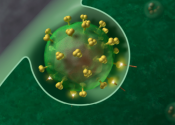Deciphering how CD4 T cells die during HIV infection
Scientists at Gladstone Institute of Virology and Immunology have solved a long-standing mystery about HIV infection–namely how HIV promotes the death of CD4 T cells. It is the loss of this critical subset of immune ...







